Donald Trump ran on an ambitious platform vowing to return jobs to U.S. citizens, but we doubt he had this in mind: Independent retailers are capitalizing on the president’s record low approval ratings to sell creative, inspiring, and oftentimes humorous anti-Trump merchandise. From politically charged fashion to scented candles that really do stink, a #Resistance economy is growing strong.
Keeping Up With Demand
“I didn’t really have dreams of doing political sweaters,” admits Rachelle Hruska MacPherson.
MacPherson is the founder of Lingua Franca, a New York City-based fashion line of embroidered cashmere sweaters that sell for $360 at high-end retailers like Saks and Net-a-Porter. The tops feature phrases like “Original Gangsta” and “Old School,” items that were bought by stars like Leonardo DiCaprio and Christy Turlington. It was a modest side business for the entrepreneur, who also runs the media company GuestofaGuest.com.
But with the election of Trump, Lingua Franca—which means “a common language”—took a sharp sartorial turn. MacPherson employs more than 30 immigrants, and her husband is half Mexican. The President’s anti-immigration rhetoric hit home. It became personal, and with that, her idea of a common language morphed into something else.
And so she began producing custom-made orders with slogans like “We Are All Immigrants” “Power To The Peaceful,” “Science Not Fiction,” “Resist,” and “I Didn’t Vote For Him.”
The reinvented line of sweaters quickly sold out, forcing MacPherson to reconsider her “hobby.” MacPherson saw a thousand orders alone for the newly released “I Miss Barack” style in the last month.
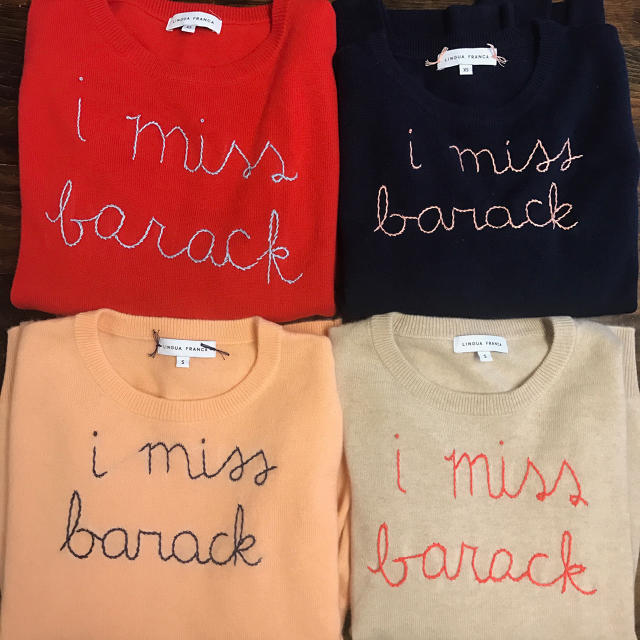
“We’re backordered on every single color and size,” says MacPherson, who has gone on a hiring spree to keep up with consumer demand, which spiked following the inauguration. “People want them now.”
MacPherson isn’t alone in her accidental business boon. Americans are turning their side businesses into printing presses and succeeding at it. These entrepreneurs sussed out that the political climate has customers wanting to wear their frustrated hearts on their sleeves. Fashion designers, craftsmen, even piñata makers are witnessing how protests can be funneled into purchases.
Independent retailers can often take political risks that big brands can’t. Retailer hubs such as Zazzle and Etsy reported a dramatic increase in political product listings during and following the election. Zazzle saw a 26% increase in political merchandise orders during the last six months, compared with those same months in 2012, reports a company rep. Meanwhile, an Etsy search for “anti-Trump” reveals nearly 5,000 products, while “pussy hats” range in the thousands.
Gauss Haus, which sells $12 knit hats on Etsy, has been swamped with “pink pussy hat” orders. Owner JJ Gauss sold more than 400 hats in January alone, with the day of the Women’s March totaling $2,000 in record sales.
“My phone kept ‘cha-chinging,’” Gauss said via email. “It was unbelievable. So many people had been inspired by the March, and they were coming to little old me…. I am very quick at my work, but I had so many in one day that I had to pull three all-nighters to get back on track.”
Call it the resistance cottage industry.
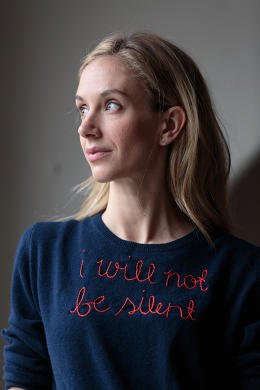
“Fired Up”
While MacPherson hails from a very Republican family in Nebraska (“My Facebook feed is not an echo chamber,” she says), the independent designer didn’t hesitate to politicalize her fashion line. Her collection is her way of communicating her opinion to the public—in the way in which some use social media. It’s a physical way of engaging in the dialogue that’s captured our country. And many in her community, she observes, are finally keeping up with politics.
“We’re fired up and outraged,” she says. “There is a positive to that.”
It’s especially poignant for MacPherson since her employees are mostly female immigrants from countries like Mexico, Syria, and Iran. She deals on a daily basis with how President Trump’s policies impact their lives. “It’s been emotional,” she admits, “there’s a heartbreaking story every day.”
As such, MacPherson felt it her duty to hire more immigrants in the last few weeks, going so far as to pursue partnering with agencies to teach refugees how to embroider. “Who better to be stitching these aspects?” she asks.
In addition, MacPherson donates the difference between market and wholesale price to a customer’s charity of choice. So far, Planned Parenthood and the ACLU have been the most popular.
“It’s totally changed my life,” she says. “I feel a deeper connection to everyone buying these… we feel like we’re doing something.”
Fashion designer Joseph Robinson of streetwear line Joe Fresh Goods cites what he felt as Trump’s “personal attack on Chicago,” referencing the President’s threats that he may soon “send in the feds,” as one reason that inspired him to take aim at the President.
The Chicago-based designer has produced politically charged tongue-in-cheek T-shirts for a decade, but his current collections catapulted his indie line into more mainstream circles. The “Fuck Donald” capsule collection, which doesn’t reference Trump’s last name (“it could be about Donald Duck,” insists Robinson, slyly), is his way of “getting people talking.”
“Every time Trump does or says something crazy, T-shirts go on fire,” he says. “And I’m pretty sure he’s gonna give me more ammo every day.”
Each batch of the collection sold out whenever the president was prominently discussed in the news. Robinson also has a collection called “Thank You Obama” modeled by Chance the Rapper. That one went viral upon its release, landing Robisnon in outlets such as Harper’s Bazaar and the Washington Post.
“I look at myself as the CNN of clothes,” Robinson tells Fast Company of fusing political sentiment with streetwear style. “I document what’s going on in pop culture with Ts.”
The Fuck Donald shirts were originally started as a joke, but after it performed so well, Robinson began producing sweatshirts and hats in the same style. Over 200 were ordered the night of the election. He’s even considering making it its own brand. “I was ready to retire these four months ago,” Robinson admits, but as the public’s appetite grows, he doesn’t see himself slowing down.
“My clothes are conversation starters,” he says, “I feel like it’s my civil duty.”
Feminist Fashion
One design repeatedly seen throughout Hillary Clinton’s campaign and spotted at Women’s Marches has been a T-shirt with the slogan, “The Future Is Female.” It was a minimalist top that went viral in 2016, but the design came from humble beginnings: It was inspired by a 1975 archival image on the Instagram account Herstory, which chronicles lesbian culture.
Rachel Berks is the founder of Otherwild, a Los Angeles store, studio, and fashion line that represents feminist and LGBT designers. In 2015, she spotted the Instagram image and loved it. So she offhandedly ordered 24 T-shirts emblazoned with the slogan. They sold out within 24 hours.
“I saw there was a need and an interest in this messaging,” said Berks.
Berks realized she had a unique opportunity to meld charity with commerce, and she began donating proceeds of sales. Since then, she kept a steady stock of the style, but consumer interest skyrocketed once the issue of defunding Planned Parenthood took hold in 2016. It then gained momentum during the later stages of Hillary Clinton’s presidential campaign, selling thousands online and showing up on celebrities like supermodel Cara Delevingne. (In fact, just this week, Hillary Clinton voiced the statement in a newly released video)
Berks assumed interest in the shirt would die down after the election. She was wrong. November 9, 2016 was her biggest sales day ever.
“It was a total shock to me,” says Berks, “I saw that people needed this rallying cry more than ever.”
For Berks, it’s a tangible way to support a cause she strongly believes in—and give hope to other like-minded women.
“In moments where people feel hopeless and helpless, they have this statement to stand and rally behind, but also they know their money is going towards a cause that needs their support,” she explains. “It’s more than just wearing a feminist slogan.”
She soon expanded into various styles, including onesies for babies, for which sales far exceeded her expectations. In fact, “The Future Is Female” line performed so well that Berks was invited to a Planned Parenthood conference for donors who contributed over $25,000. The indie designer couldn’t believe her little shirt could go that far.
“To be in that room that was filled with wealthy patrons, and then me—who is just this business owner who just had this idea and had the opportunity to watch it go viral and raise a lot of money for this organization that I deeply believe in, that was really, really special,” she reflects.
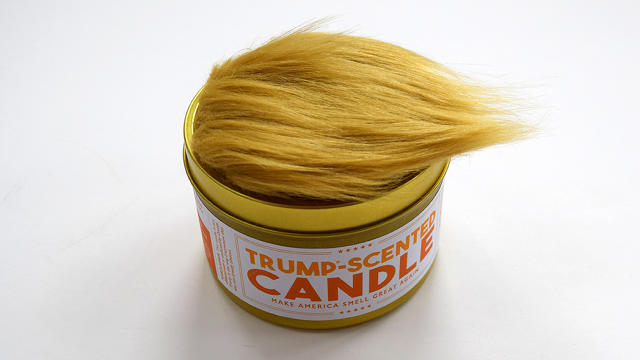
Hope In Humor
Some take a different, more light-hearted approach. Comedy writers J.D. and Kate Dobson, founders of JD and Kate Industries in St. Louis, Missouri, funneled their political frustration into … wax.
In 2016, the married couple began lightly selling Putin-inspired candles on Etsy, as a joke, what J.D. refers to as “barely even qualifying as a side project.” This past fall, they added an $18.50 “Anti-Trump Trump-Scented Candle,” which seemed like a “natural companion” to the budding collection.
The Trump candle smells of a mix between meat and suntan lotion, and comes with an orange wig lid. “It smells bad,” confirms J.D Dobson, “it’s meant to.”
In fact, they don’t even recommend lighting it. Although, they report, some actually do enjoy the scent. (“There’s no accounting for taste,” says Kate.) Three dollars of every purchase benefits nonprofits working to help Syrian refugees, such as Doctors Without Borders.
It sold well during the holidays, but following Trump’s win, sales soared. After the inauguration, they soared even higher.
“We never envisioned back when we started it of wanting to profit off this bad thing that was happening to our country,” says Kate Dobson. “The good news is that we don’t really profit off of it when you take into account how long it takes us to make those stupid wigs.”
What would have easily become a gag gig has become a business that has overtaken their daily lives. One of the most challenging aspects has been the amount of time spent hairstyling.
“I thought it would be easy [to style Trump’s hair] but it’s surprisingly hard,” reports Kate Dobson. “We hate it.”
While their objective is to poke fun at Trump’s image, they hope their products serve as a way to communicate their beliefs instead of trivializing national politics.
“We don’t want to minimize or make light of what is happening,” explains Kate. “We hope that we are using humor to be informative of what is happening in the country.”
For consumers interested in a more literal interpretation of “Dump Trump,” there are poop bags that sell for $12.
Annie Grossman, a dog trainer in New York, began exploring launching her own pet necessity line in May 2016. She first turned to her father, political cartoonist Robert Grossman, to draw the image that would grace her first product.
“I said, ‘Hey, I know it’s not the op-ed page, but would you mind making a picture of Donald Trump for a poop bag?’” she recalls. Her father was initially against it, as “he didn’t want to be associated with excrement in any way.”
Grossman finally got her father on board, but securing a manufacturer provided a different set of challenges—no American company wanted to fulfill her vision. “They were scared about getting into politics,” she says.
This fall, she ultimately ordered 5,000 bags from China, which have now nearly sold out. There was no advertising or press, it was just word of mouth that had her product being sold in gift shops and pet stores across the country.
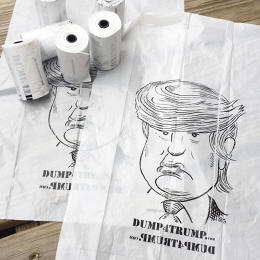
Grossman, a former journalist, certainly didn’t see the poop bag industry in her future, and harbors complicated feelings on whether she wants to continue protesting Trump in such a manner.
“It almost feels like war profiteering at this point,” she says. “It felt more like an art project than anything.” She also questions, to some degree, the point of it: “I don’t think it has really made any difference in the world.”
But considering consumer interest, she will likely do another batch, perhaps even switching up the caricature of Trump. “I can only do it better now,” she says of the business lessons she’s learned. “Once you’ve imported 5,000 poop bags from China, the second’s time gotta be much easier.”
As for her father, he’s finally come around. (“He’s still a bit squeamish,” she relents, “but I gave him a cut, so what’s he gonna do?”)
Business Therapy
Navigating next steps in business is always challenging, but perhaps even more so when your business was somewhat accidental—and reliant on the political atmosphere. Many budding entrepreneurs are genuinely touched their products resonate with fellow Americans who harbor similar discontent with the current administration, but how long will that last?
“It depends on how long Donald Trump is our president,” says MacPherson.
That day might not come soon, but till then, business will be its own kind of therapy; it allows these entrepreneurs to communicate their discontent in their respective creative fields.
“I felt more anxious when I felt I wasn’t doing anything,” stresses MacPherson. “I’m just using the tools that I’ve been given to have a voice and speak up against what’s happening.”
While the desire for an anti-Trump product might soon wane, these entrepreneurs are learning how to scale their companies and prepare for the next iteration of their business lines. The Dobsons, for example, are growing their candle empire, including commemorative smell-good editions to honor politicians like Canadian Prime Minister Justin Trudeau (it has “notes of maple and chai”) or iconic American politician Aaron Burr (“smells of gun smoke drifting low in the Weehawken dawn”).
“I don’t see ourselves retiring on this, but we do see it as a growing portion of our income,” says J.D. Dobson. “Now it’s more than just a hobby.”
Rachelle Hruska MacPherson
“It’ just feels like I’m using the tools that I’ve been given to have a voice,” says Rachelle Hruska MacPherson, founder of Lingua Franca embroidered sweaters.
The following are many of the women who work with MacPherson at Lingua Franca, based in New York City.
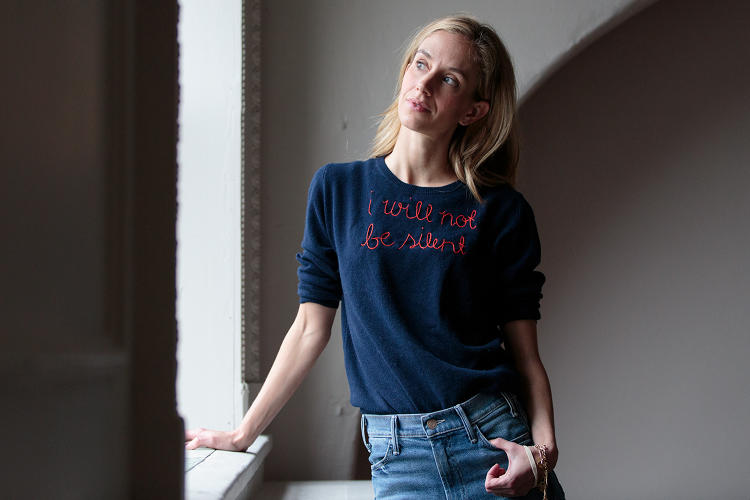
Kate Hudson
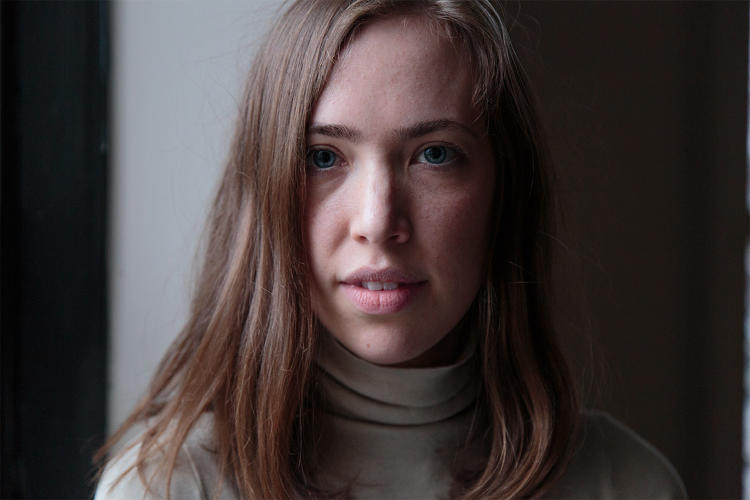
MacPherson has seen a dramatic increase in consumer demand since she began incorporating political slogans such as “We Are All Immigrants,” “Resist,” and “I Didn’t Vote For Him.”
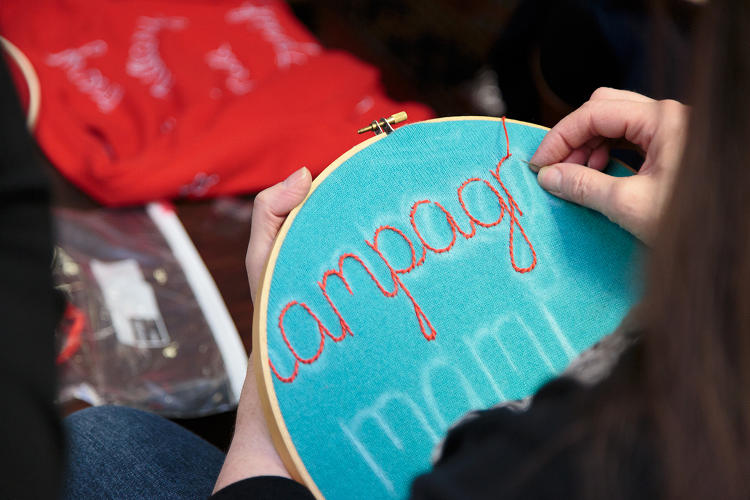
Aniko Horvath
MacPherson reports that her workers, many of them immigrants, have trouble finding work.
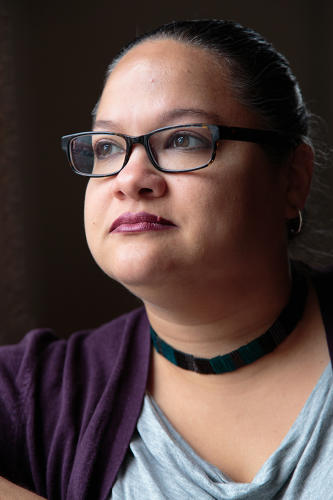
Sheila Halali
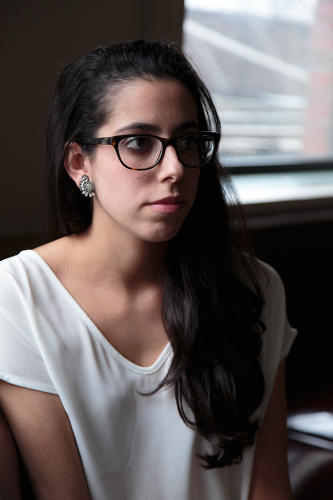
“We’re backordered on every single color and size,” says MacPherson of her politically-charged fashion line.
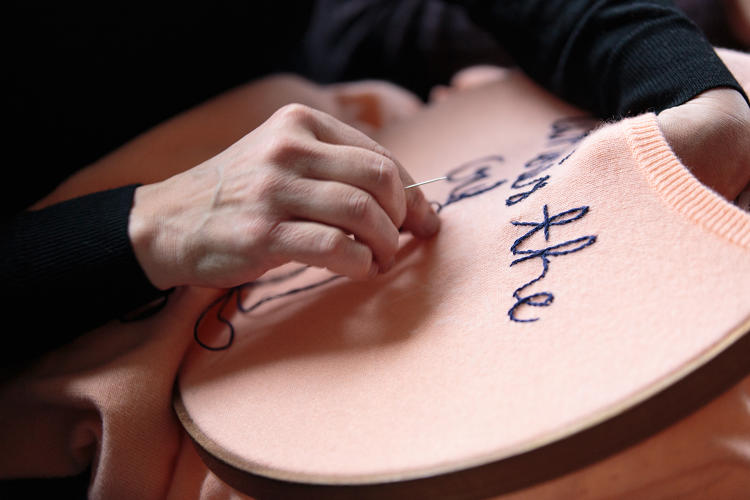
Lauren Williams

Maggie Lee and her daughter Penelope
MacPherson has over a dozen immigrants working on her collection. “Who better to be stitching these?” she asks.

“We feel like we’re doing something,” says MacPherson of her staff.
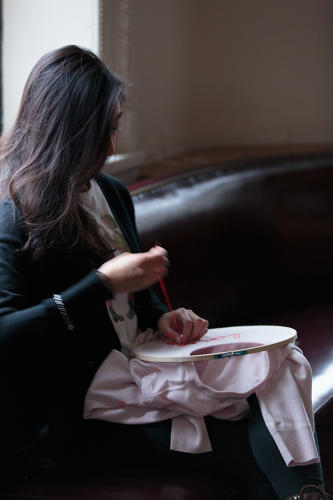
Diane Jaffe
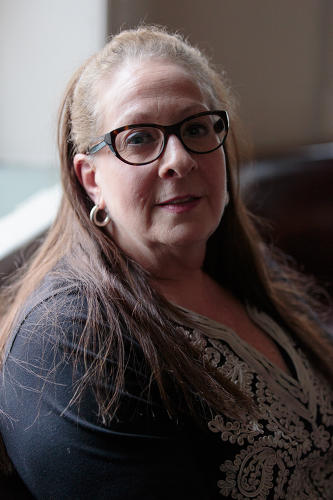
Maggie Lugano
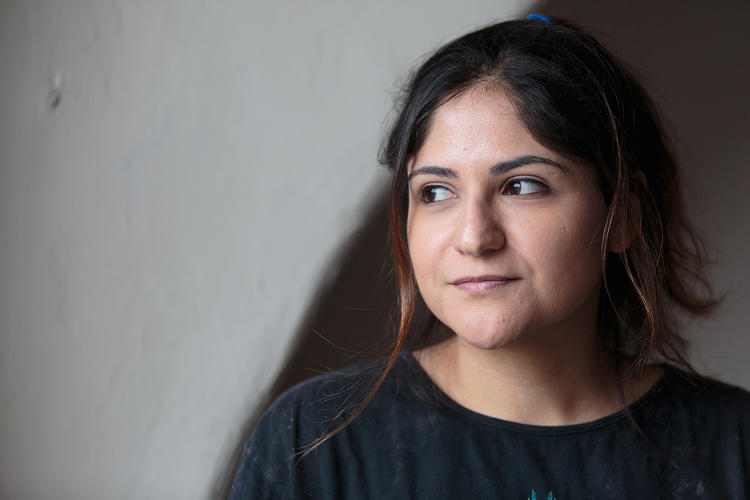
“Making something that’s really valuable, high-end, and precious that people value, to me, that’s sending a giant message,” says MacPherson. “It can be worn over and over again.”
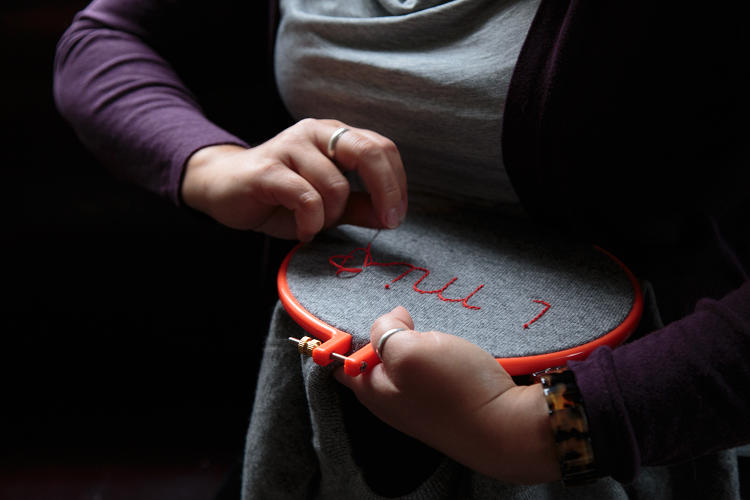
Danielle Gregorie
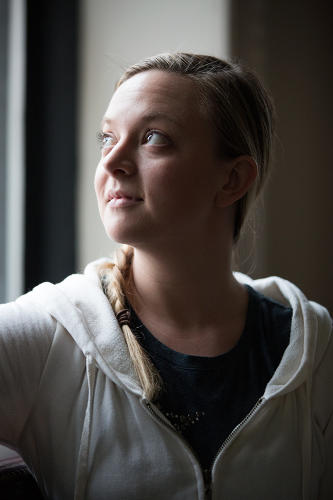
Karen Heimann
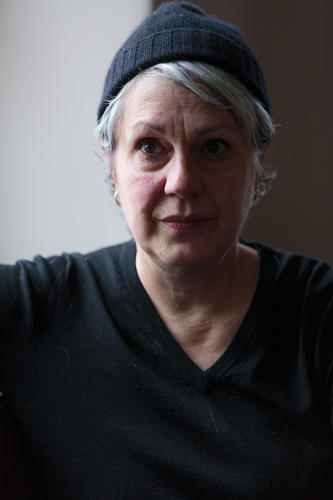
Proceeds of Lingua Franca’s political collection benefit various charities, such as Planned Parenthood and the ACLU.
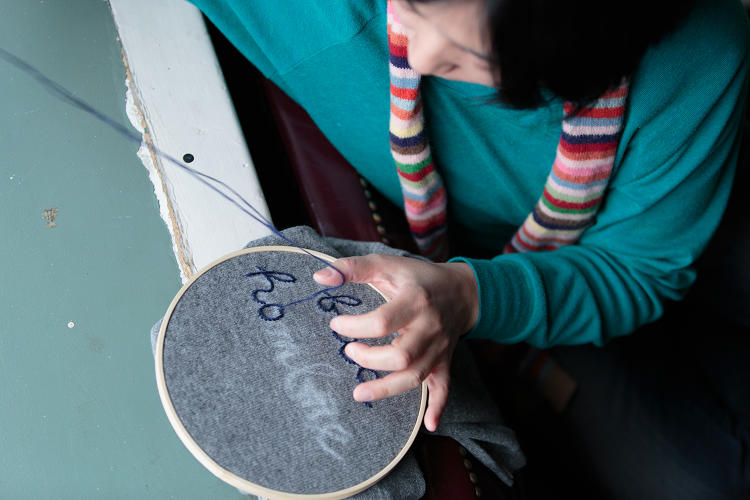
Anahi Sanchez

Shevawn Norton

Rachelle Hruska MacPherson employs a wide range of embroiderers, including immigrants and fashion school students.
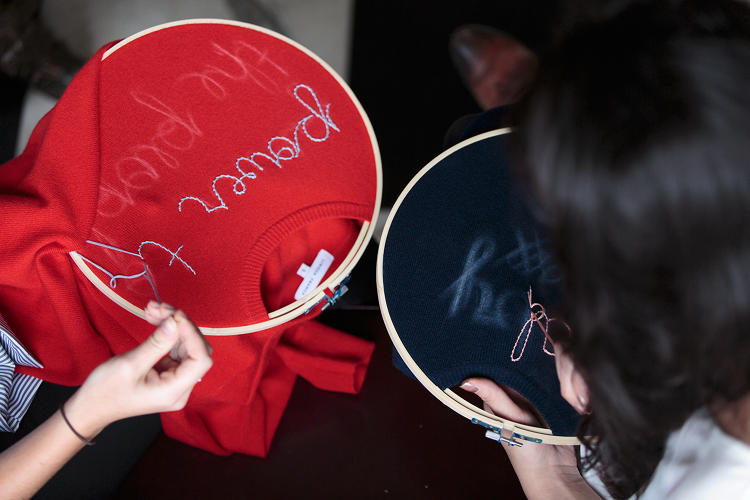
Kate Hwang
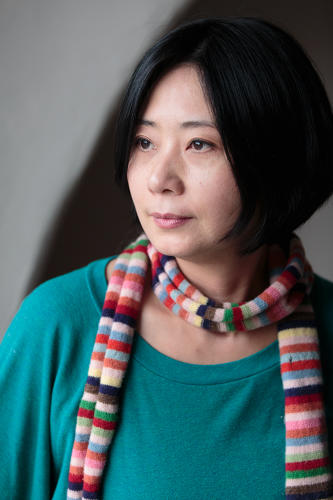
Katherine Khorassani
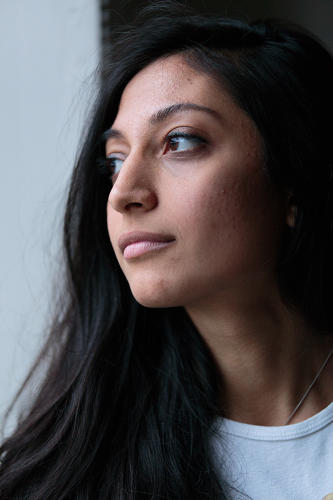
Fast Company , Read Full Story
(157)